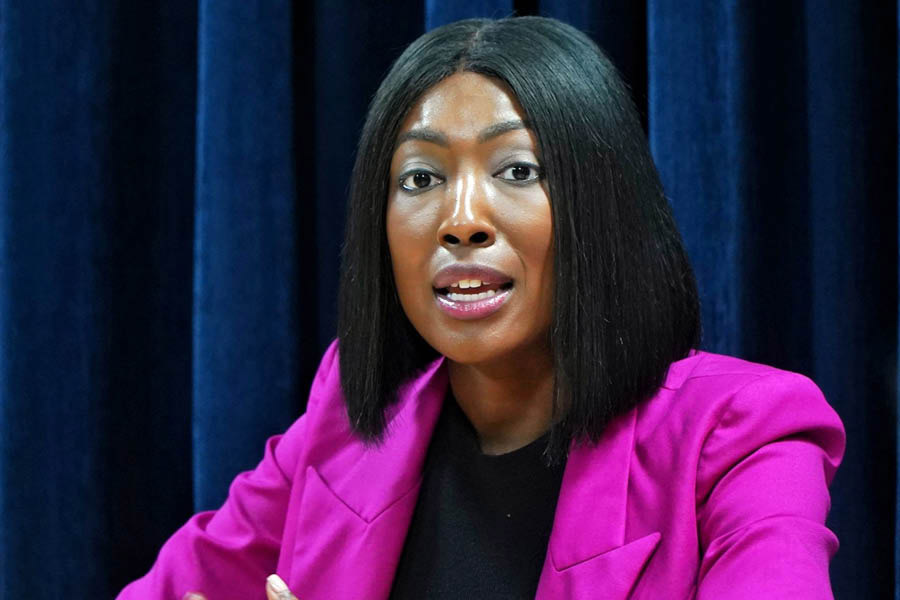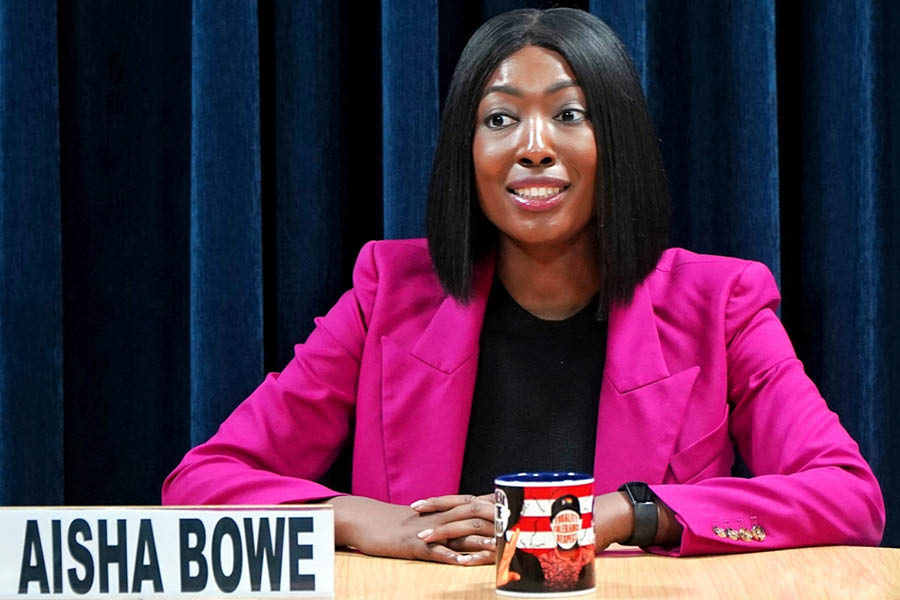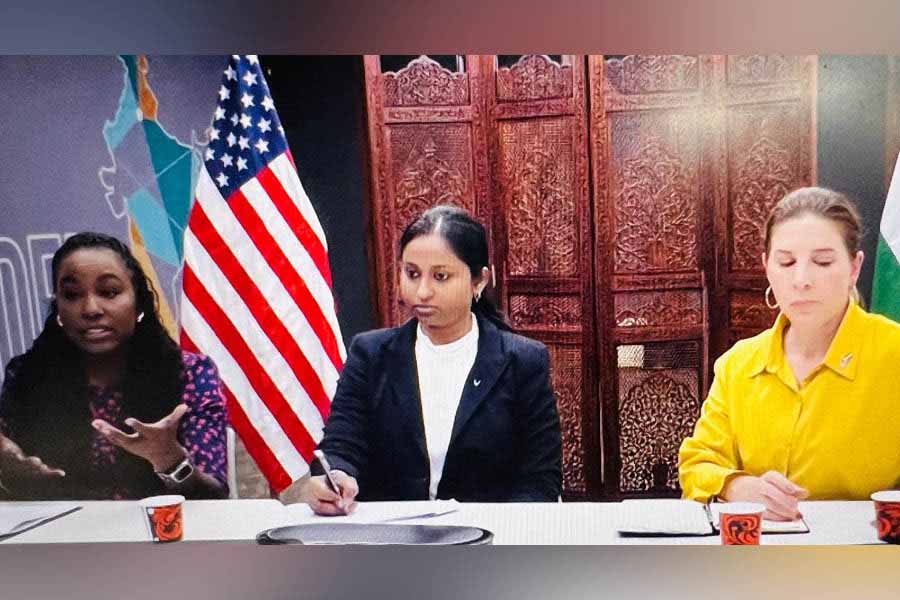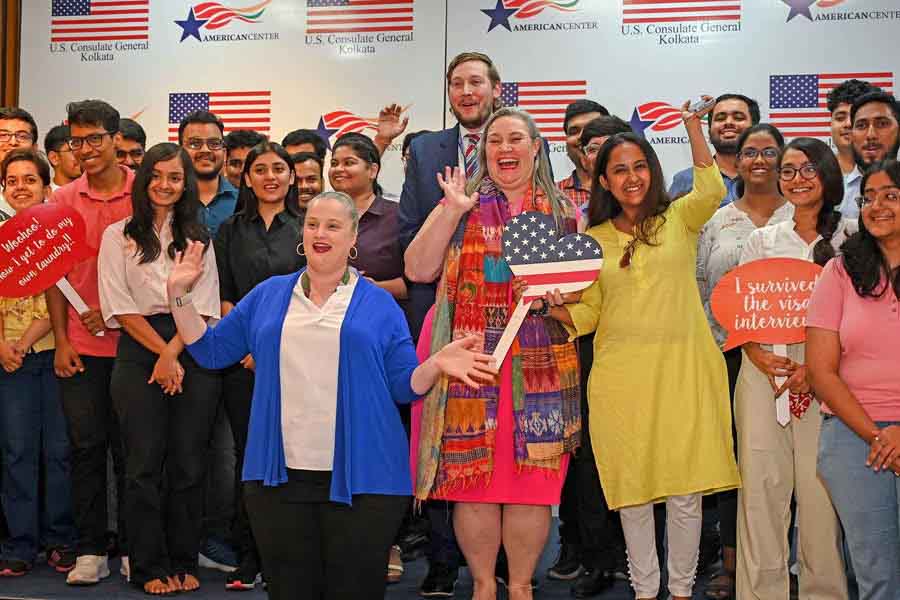Touring four Indian cities as a highly sought-after speaker, Aisha Bowe, the CEO of STEMBoard and an aerospace engineer with six years of experience as a rocket scientist at NASA, is set to become the first African-American woman to travel to space with Blue Origin, a private aerospace company.
On September 16, Aisha was in Kolkata at the American Center where she interacted with students, teachers and the media.
Aisha conducted a presentation and interactive session with senior school students to teach them about STEM education and inspire them to break barriers. Following this session, Aisha also interacted with educators regarding STEM based Education. Given her depth of expertise, Aisha spoke about how people had always looked down on her and a teacher even once told her that she should be a cosmetologist.
Having gotten used to breaking barriers, Aisha said: “I have had to constantly prove myself. No one ever believed me that I was an engineer. So in the earlier days before social media I would carry my degrees and papers with me in my car and show those around wherever I went as a speaker. No one believes that someone who looked like me was capable of being an engineer.”
After the two sessions with the students and educators, Aisha spoke to reporters from different media outlets, where My Kolkata was present to ask her some pertinent questions about her experience and his upcoming adventure.
Speaking to the media about several points, including the challenges she has faced as well as how she has been breaking barriers, Aisha said something very interesting about touring as an engineer. She said: “I feel like I am competing with top athletes or artistes. It’s not just them who tour but I am on a tour as well and I don’t think many would be able to get through such an extensive itinerary as the one I have during this visit to India.”
My Kolkata put some questions to Aisha at the media interaction and her more than candid answers to them.
My Kolkata: Given your experience with NASA, we want to know your thoughts on if there are any gender barriers prevalent for women going to space, women of colour going to space. What is your experience, be it from a NASA perspective or even from a privatized space technology sector?
Aisha Bowe: I am not going to speak about this from an agency perspective but as an individual. The numbers are that approximately 700 folks have been to space and of that, 700 roughly 100 are women. When you start to break it down, I only know four women who are either Indian born or of Indian heritage that are participating or have participated in space programmes. That’s a small number when you look at African-American women, when you look at other countries we’re really kind of trickling in terms of ones and twos a lot of people are part of the firsts. That number is a by-product of the fact that there aren’t many human-rated rides to space and it still is a very expensive thing.
While I would like for there to be more inclusivity in space, I think we have to take a step back and start to look at how we empower countries to create strong space programmes so that we can get at the inclusivity piece because it would be unfair to say it’s not inclusive right now. The US, Russia and the Europeans, only a couple of entities actually have the ability to fly people. Once India develops the ability to fly people, you will see more Indians in space.
Once Africa or wherever develops the ability to fly people, these numbers are going to change. What I prefer to focus on is the fact that India created a Mars mission and they made it to Mars on the first shot for far less than 100 million dollars. That’s absolutely incredible and what that means is that this country has the capacity and the capability to do incredible things in space with people and that is where the focus should be because India can become a global power when it comes to space in the next 50 years.
MK: What is the part of your visit to space that you’re most looking forward to? Could you delve into a little bit of details of what your mission in space is going to be like?
AB: I cannot tell you about the mission right now. What I can say is that I’m going to be doing some research and it’s going to be exciting. I have partnered with a US university and I can’t wait to talk about it but I gotta save something for later. About my trip, I am looking forward to looking at Earth. One of the things people commonly say is that there’s not enough time to look out the window and so the idea of finally making it to space and being able to look down on earth and see just the terrain, no border is really exciting to me and I can’t wait to have that opportunity.


I consider myself the pro-athlete of what I do
Aisha Bowe
MK: You spoke about touring as an engineer and comparing that to what top athletes do. You also spoke about how people around you are scared about your trip to space. Could you tell us a little bit about your mindset of how you keep others’ fear from projecting on to you and how you think about touring similar to an athlete or artiste?
AB: I think that success is a mirror for others’ insecurities. So the more that you achieve, the more that people will project their fear on you but that doesn’t mean that you have to listen to it or that it should really impact what it is that you do. I think once you decide the things in life that are important to you, just let the other chips fall where they may. The engineering and touring bit you are talking about is that I am like a pro-athlete of what I do, or at least I think of myself that way. I work long days, if you had seen the schedule they had put me on for this tour, I am definitely a pro-athlete. But people don’t think about science and space in the same way, so I wanted to be able to bring that out.
In order to build a company, we often train as hard as athletes but people don’t see that work. So they don’t understand the level of discipline, the level or rigour. The level of energy and effort it takes to do this job and that’s where I wanted to be able to change the paradigm. I wanted to be able to go around and showcase what it is actually like to be in this field. I also feel as though sometimes when people become successful they only talk about the success, they don’t talk about the failures and I think it is important to talk about all the highs and all the lows.
It’s important for people to know the actual path that you took to get there because if they think that it’s perfect all the time and they encounter a setback they will think that they failed. But they haven’t and that is the other part of this journey for me to be totally and completely transparent about the things that I have encountered and what I think is important in the hopes that it empowers other people to do the same because we are no longer in a time where we are facing problems that can be solved only by our respective nations.


